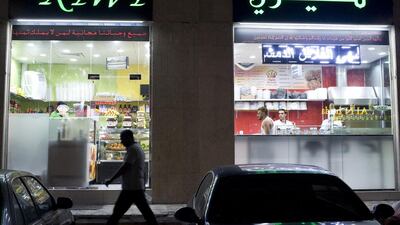Down under the high-rise apartments, through the narrow streets and side by side with residential villas in the Khalidiya district, a foodie scene is emerging.
Japanese, British, Saudi and a host of other international restaurants have opened, but two stand out from the others.
“We offer our meals for free to those who can’t afford them,” a sign reads.
Written in Arabic, it appears in the windows of Kiwi Cafeteria and Moulouk Al Shawarma (King Shawarma) – two restaurants directly opposite each other on 14th Street.
“The cost of living is very high. Most expatriates, especially those hailing from Asia and India, refrain from eating out to cut their budget,” says the Emirati owner, who does not wish to be named. “I wanted my shop to give away free meals to these group of people.”
The 31-year-old opened his first restaurant in Dubai five years ago and now owns six across the UAE. All have the same sign on public display.
Travelling, he says, was the driving force of change in his attitude. He worked in a media company for two years and this led him to Sudan, Afghanistan, Syria and Jordan.
“These experiences were an eye-opener. The war has left many people unemployed, and others struggle to make a living for themselves. I witnessed the poverty and difficult life led by others and this really influenced me.
“Sometimes, the food we waste could be sufficient to eradicate their poverty.”
The sign offering free food was hung in the Khalidiya restaurants about a year ago, but before that he encouraged his staff to distribute leftovers to the poor in the neighbourhood.
“Every time we open a new branch, we make sure to distribute food and beverages to people for two days.”
This way people get to know about his new shop and also its mission of serving food for free.
The two restaurants in Khalidiya are known for their shawarma sandwiches and drinks, which he attributes to the talent of his staff: people from Syria, Egypt and Jordan work in both. A small shawarma costs Dh6 in his restaurants, but this is still beyond the means of many workers, who usually can only afford a tea and paratha roll for Dh2.
“The poor are free to pick any meal they wish from the menu. There is no restriction on them.”
And it’s not just labourers from South Asia who take up the offer; there are Arabs, too.
“Most of my needy customers are construction workers and [rubbish] collectors from Bangladesh, Nepal, and some Egyptians who work as security guards.
“There are also many Arabs from the Levant who live with very low salaries. They know my shops and my shops offer them free food regularly.”
More than 10 people come to both restaurants in Abu Dhabi every day for the free meals.
“We encourage people to take the free meal and leave. This way, they don’t get unwanted attention from other customers.”
He also plans to translate the sign into English and Hindi.
“I do not care if these people are Muslims or non-Muslims. At the end of the day, we are all honourable human beings.
“I pray that these people keep coming back, really,” he says. “You don’t lose anything by giving, instead, Allah increases your provision.”
Asmaa Al Hameli is a features writer at The National.
thereview@thenational.ae

